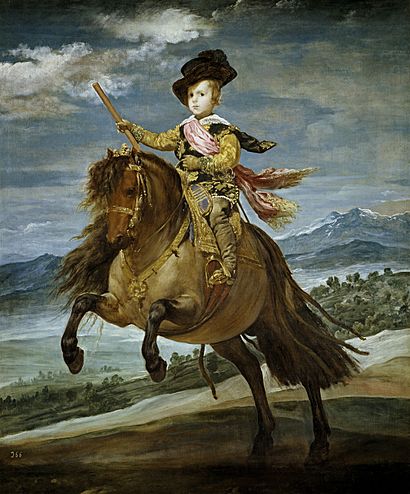Equestrian Portrait of Prince Balthasar Charles facts for kids
Quick facts for kids Equestrian Portrait of Prince Balthasar Charles |
|
|---|---|
 |
|
| Artist | Diego Velázquez |
| Year | 1635 |
| Medium | Oil on canvas |
| Dimensions | 209 cm × 173 cm (82 in × 68 in) |
| Location | Museo del Prado, Madrid |
The Equestrian Portrait of Prince Balthasar Charles is a famous painting by Diego Velázquez. He painted it in 1634–35. It shows Balthasar Charles, Prince of Asturias riding a horse. Today, you can see this painting at the Prado Museum in Madrid, Spain.
Contents
About This Famous Painting
This painting is a portrait of a young prince. Prince Balthasar Charles was the son of King Philip IV of Spain. Velázquez was the official painter for the king. He was asked to paint many portraits for the royal family.
Why Was It Painted?
Velázquez was asked to create a series of paintings. These were for a special room called the Hall of Realms. This room was part of the Buen Retiro Palace in Madrid. The painting of Prince Balthasar Charles was placed between two larger paintings. These showed his parents, King Philip IV and Queen Elisabeth of France.
The paintings were meant to show the power of the royal family. They also showed their skill at riding horses.
What the Painting Shows
The painting shows Prince Balthasar Charles on a large, strong horse. The horse looks like it is rearing up. The sky behind them is dark and cloudy.
Even though he was a young boy, the prince looks calm. He sits very straight on the horse. This was important for the painting's message. It showed him as a confident rider. It also showed him as a strong future leader.
The prince holds a special stick called a baton. He also wears a sword and a military sash. These items are symbols of his power. They show he has authority and is ready to lead.
A Clever Trick by the Artist
Some art experts have noticed something interesting. The horse's belly looks very thick. This might have been a clever trick by Velázquez. The painting was meant to be seen from below. When viewed from that angle, the horse's belly would look normal. This shows how skilled Velázquez was with perspective.
Other Portraits of the Prince
There is another painting of Prince Balthasar Charles on horseback. This one is at the Wallace Collection in London. Experts believe it was painted in Velázquez's studio. This means other artists working with Velázquez might have helped create it.
See also
 In Spanish: El príncipe Baltasar Carlos a caballo para niños
In Spanish: El príncipe Baltasar Carlos a caballo para niños
- List of works by Diego Velázquez
 | Bayard Rustin |
 | Jeannette Carter |
 | Jeremiah A. Brown |

